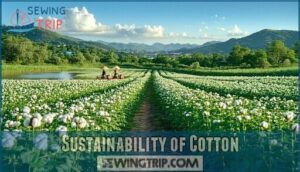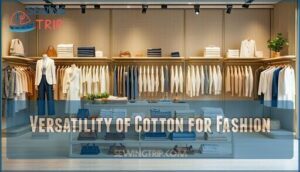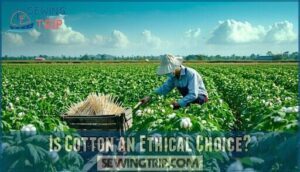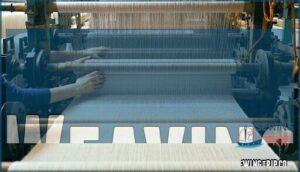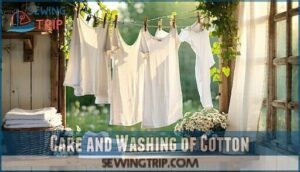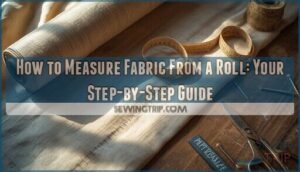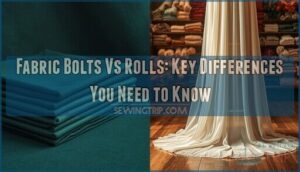This site is supported by our readers. We may earn a commission, at no cost to you, if you purchase through links.
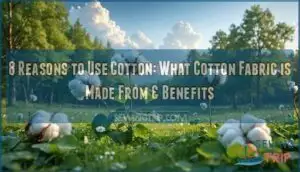
Cotton’s breathable and absorbent properties keep you comfortable while its softness feels gentle against your skin.
It’s naturally hypoallergenic, making it perfect for sensitive skin types.
You can wash it easily, and it gets softer with each cycle.
Cotton’s versatility works for everything from casual t-shirts to formal dress shirts.
It’s also sustainable when you choose organic varieties, supporting eco-friendly farming practices.
Plus, cotton’s durability means your clothes last longer, saving money over time.
Understanding cotton’s production process reveals why this natural wonder performs so well.
Table Of Contents
Key Takeaways
- You’ll get superior comfort and health benefits – Cotton’s natural breathability, moisture-wicking properties, and hypoallergenic nature keep you comfortable while being gentle on sensitive skin types.
- You’re choosing a sustainable and versatile material – Cotton’s biodegradable properties and organic farming options reduce environmental impact, while its adaptability works for everything from casual t-shirts to formal wear.
- You’ll save money through durability and easy care – Cotton fabric gets softer with each wash, lasts longer than synthetic alternatives, and requires simple maintenance with cool water washing.
- You’re supporting ethical production when you choose certified organic – Organic cotton uses 91% less water, eliminates harmful pesticides, and often includes Fair Trade certification that ensures safe working conditions and fair wages for farmers.
What is Cotton?
You’ve probably worn cotton hundreds of times without thinking twice about this remarkable natural fiber that comes from cotton plants.
Cotton starts as fluffy white bolls growing on cotton plants, then gets transformed through harvesting, ginning, and spinning into the soft, breathable fabric you know and love.
Cotton Origins
Cotton history spans over 7,000 years, beginning in ancient Pakistan and Peru.
Ancient trade routes spread cotton material across continents during medieval times. The Crusades introduced Europeans to this textile marvel through commerce with India and China.
Cotton farming evolved from labor-intensive manual processing until the cotton gin revolutionized production.
Today’s cotton fabric industry employs 250 million people worldwide, generating $12 billion annually. Your cotton shirt connects you to this rich fabric heritage, linking modern comfort with textile roots that transformed civilizations through natural cotton’s enduring appeal.
Cotton Production
Modern cotton production presents a complex picture that balances tradition with innovation. While cotton farming accounts for 33% of global textile fiber production, the industry faces mounting pressure to reform unsustainable practices.
Here’s what makes cotton production challenging:
- Water consumption – Conventional cotton cultivation requires 2,500-3,000 liters of water per kilogram of fiber
- Chemical dependency – Heavy pesticide use threatens local ecosystems and farming communities
- Land usage – Cotton occupies 2.5% of the world’s arable land while supporting 250 million livelihoods
The cotton industry is evolving through sustainable crop management techniques. Cotton harvesting now incorporates advanced gin machinery that improves fiber processing efficiency. During bale formation, modern equipment compresses cotton into standardized 500-pound units for shipping.
Organic cotton manufacturing uses 91% less water and 62% less energy than conventional methods. Cotton cultivation through programs like the Better Cotton Initiative promotes responsible farming practices. As consumer awareness grows, the cotton industry continues adapting toward more sustainable cotton production methods. Understanding cotton fabric properties is essential for creating high-quality textiles while minimizing environmental impact.
Cotton Fabric Properties
Cotton’s natural properties make it one of the most versatile fabrics you can choose for your wardrobe and home.
Cotton adapts beautifully to every need, from breathable summer shirts to cozy winter flannel.
You’ll discover why cotton stands out from synthetic materials when you understand its unique characteristics of absorbency, breathability, and softness.
Absorbency
When you’re looking for superior moisture control, cotton’s absorbent nature delivers unmatched performance.
This natural fiber excels at water absorption, pulling sweat away from your skin for effective sweat management.
Cotton’s liquid retention capabilities mean faster drying time compared to synthetic alternatives, while its fiber retention properties resist odor buildup for lasting freshness.
- Superior moisture absorption – Natural fibers pull sweat away from skin instantly
- Excellent sweat management – Keeps you dry during physical activities and hot weather
- Fast drying time – Cotton releases moisture quickly for comfort all day
- Effective dampness prevention – Wicks liquid away before it becomes uncomfortable
- Natural moisture control – Regulates temperature without synthetic chemicals or treatments
Breathability
Your skin stays cool thanks to cotton’s natural air flow system.
This breathable material creates excellent fabric ventilation, allowing moisture wicking action that pulls sweat away from your body.
Cotton’s thermal regulation keeps you comfortable in warm weather, unlike synthetic fabrics that trap heat.
The natural fiber structure promotes superior fabric breathability while remaining hypoallergenic for sensitive skin types.
Softness
Nothing beats the gentle texture of natural fiber against your skin.
Cotton’s soft materials create unmatched fabric comfort through its hypoallergenic properties.
- Fabric feel remains consistently smooth through multiple washes
- Comfort factor increases as cotton fibers naturally soften over time
- Texture analysis reveals cotton’s fine structure creates gentle contact
- Softness improves with proper care and quality cotton selection
- Cotton properties include natural flexibility that prevents skin irritation
Sustainability of Cotton
Cotton sustainability often starts with organic farming practices that transform how we grow this essential fiber.
Eco cotton production uses 91% less water and 62% less energy than conventional methods.
Organic farming eliminates synthetic pesticides, protecting soil health and biodiversity.
Water conservation techniques like drip irrigation reduce waste by 40%.
Regenerative practices improve carbon capture while supporting renewable resources.
Green production methods cut emissions substantially – switching saves one ton of carbon per 2.2 tons of fabric.
Cotton’s natural biodegradability makes it environmentally friendly, decomposing completely in compost systems without harmful residues.
Versatility of Cotton for Fashion
Every trendy garment you see starts with cotton’s incredible adaptability. Fashion designers rely on cotton fabric properties to create everything from structured blazers to flowing maxi dresses.
Cotton versatility shines through countless style options—whether you’re crafting casual weekend looks or professional attire. Modern textile innovation has expanded cotton types beyond basic weaves, giving you access to sophisticated fabric design choices.
From garment making perspectives, cotton works beautifully alone or blended with other fibers. Textile production advances mean today’s cotton trends offer enhanced durability and comfort, making your wardrobe investments worthwhile.
The quality of cotton fabric is often determined by its thread count importance, which affects the overall feel and performance of the garment.
Cotton for Sensitive Skin
When you have sensitive skin, choosing the right fabric becomes essential for your daily comfort.
Cotton stands out as nature’s gentle solution, offering remarkable hypoallergenic properties that work wonders for delicate skin types.
Here are four key benefits that make cotton perfect for sensitive skin:
- Natural barrier protection – Cotton’s gentle textures create a soft shield between your skin and harsh environmental elements
- Moisture management – The fabric wicks away perspiration while allowing air circulation to prevent irritation
- Chemical-free comfort – Pure cotton contains no synthetic additives that might trigger allergic reactions
- Breathable design – Natural fibers promote airflow, reducing heat buildup that can worsen skin sensitivities
Cotton’s skin-friendly nature makes it ideal for allergy prevention.
Unlike synthetic materials that can trap heat and moisture, cotton provides excellent skin comfort through its breathable structure.
The natural fibers create an allergy-friendly environment that reduces inflammation risks.
Whether you’re dealing with eczema or general skin sensitivity, cotton’s hypoallergenic properties offer reliable protection without compromising style or durability.
Is Cotton an Ethical Choice?
While cotton’s gentle touch makes it perfect for sensitive skin, you should know that choosing cotton means making an ethical statement.
Every cotton purchase is a vote for the kind of world you want to live in.
The reality isn’t always pretty – conventional cotton production faces serious challenges around labor rights and environmental stewardship. Cotton ranks among the most chemically intensive crops, using 16-25% of global pesticides despite covering only 2.4% of farmland. Reports show unsafe working conditions, low wages, and forced labor persist in many supply chains.
However, you can make a difference through conscious choices. Sustainable farming and Fair Trade certification create positive change:
- Eliminates child labor and guarantees safe working conditions
- Guarantees fair wages that support farming families
- Promotes gender equality and women’s empowerment
- Requires environmental ethics with reduced chemical use
- Supports organic cotton production methods
- Encourages ethical consumerism through transparent supply chains
When you choose certified organic cotton with Fair Trade labels, you vote for better eco impact and labor rights. Your purchasing power drives demand for sustainable farming practices that protect both people and planet. Understanding cotton certification is vital to making informed decisions about the clothes you buy.
How is Cotton Fabric Made?
You’re about to discover the fascinating journey from fluffy cotton bolls to the soft fabric in your favorite t-shirt.
The process involves three main steps: harvesting the cotton fibers, spinning them into yarn, and weaving that yarn into durable fabric.
Harvesting
The harvest begins when cotton bolls split open, revealing fluffy white fibers ready for Cotton Picking.
Modern Farm Equipment like mechanical pickers and strippers collect cotton efficiently, boosting Crop Yield compared to hand-picking methods.
These Harvest Methods protect the cotton plant while maximizing Fiber Extraction.
After collection, cotton harvesting leads directly to ginning, where cotton production process separates seeds from lint.
Smart cotton farming practices guarantee sustainable operations year after year.
Effective cotton harvesting also involves understanding cotton harvesting equipment to optimize the process.
Spinning
After ginning separates fibers from seeds, spinning transforms raw cotton into usable yarn through several stages.
This cotton spinning process creates strong, flexible threads for fabric production.
- Carding Process: Aligns fibers and removes remaining impurities
- Fiber Blending: Combines different cotton qualities for consistency
- Yarn Formation: Draws out fibers into continuous strands
- Spinning Techniques: Uses ring-spinning or rotor methods for thread production
- Thread Production: Creates final yarn ready for weaving into fabric
Weaving
After spinning creates strong yarns, the weaving process begins at textile mills.
Modern looms interlace vertical warp threads with horizontal weft threads using precise loom mechanics. You’ll find operators adjusting yarn tension and controlling weave patterns like plain, twill, or satin.
Fiber blending happens during this stage, mixing cotton with other materials. The tight interlacing creates fabric density that determines durability.
Cotton weaving transforms simple yarns into sturdy cotton fabric through this methodical fabric weaving process, producing everything from lightweight shirts to heavy denim, which results in strong yarns and sturdy cotton fabric.
Types of Cotton Fabrics
You’ll find cotton fabrics come in dozens of varieties, each designed for different purposes and comfort levels.
From soft jersey knits to sturdy denim weaves, these fabric types showcase cotton’s incredible versatility in creating everything from casual t-shirts to work pants, highlighting the variety of cotton fabrics.
Jersey
When you slip into jersey cotton, you’re choosing comfort that moves with you.
This fabric weave creates a knit construction that’s softer than traditional woven cotton.
Jersey knit offers natural fabric stretch, making it perfect for active lifestyles.
Here’s why jersey cotton wins hearts:
- Ultimate comfort – Cotton blend fibers feel gentle against skin
- Freedom of movement – Fabric stretch accommodates every bend and reach
- Breathable design – Cotton fabric keeps you cool during activities
- Easy care – Textile dye holds well through countless washes
Jersey cotton uses a special knitting process instead of standard weaving.
This creates flexibility while maintaining cotton benefits like moisture absorption.
The types of cotton fabrics include jersey as a top choice for t-shirts and casual wear.
Understanding cotton fabric types can help you make informed decisions about your clothing choices.
Denim
Denim represents cotton durability at its finest, thanks to the diagonal twill weave that creates legendary toughness.
From rugged work pants to high-fashion runways, denim history shows this cotton fabric’s incredible versatility across jean styles and cotton blends.
- Fabric dye techniques create the classic indigo look that ages beautifully over time
- Cotton vs synthetic comparison reveals denim’s breathability beats artificial alternatives
- Denim care involves washing inside-out to preserve color and cotton durability
Flannel
Flannel’s brushed cotton fabric wraps you in exceptional warmth during cold months.
This cotton blend creates fabric softness through specialized textile dyeing and fabric weaving techniques.
Winter apparel makers favor flannel types for pajamas, shirts, and bedding because of cotton durability.
The brushed surface traps air, providing insulation while maintaining breathability that makes cotton fabric comfortable year-round.
Care and Washing of Cotton
Cotton care requires thoughtful washing instructions to maintain its natural properties and extend fabric life. Proper cotton care involves understanding shrinkage prevention, water temperature control, and effective drying methods.
Here are three essential cotton laundry tips:
- Use cool water (30°C or below) – Hot water causes shrinkage and fading, while cool temperatures preserve cotton’s structure and color vibrancy.
- Choose mild detergent without bleach – Harsh chemicals damage cotton fibers, reducing their natural stain resistance and softness over time.
- Dry on low heat or air-dry – High heat makes cotton brittle and increases shrinkage, while gentle drying methods maintain fabric integrity.
For stain removal, treat spots immediately with natural solutions like white vinegar or baking soda paste. Avoid fabric softening products that coat fibers and reduce cotton’s natural absorbency.
Always check care labels for specific washing instructions, as cotton blends may require different treatment. Machine washing works well for most cotton items, but delicate pieces benefit from hand washing.
Proper shrinkage reduction techniques and careful attention to drying methods maintain your cotton garments’ comfort and durability for years. Understanding cotton fabric care is vital for maintaining the quality and longevity of your cotton products.
Why Choose Cotton?
You’ve made the smart choice by considering cotton for your wardrobe and home essentials. Cotton stands out as nature’s most practical fabric, offering unmatched comfort while supporting sustainable living practices.
Cotton is Sustainable and Breathable
Choosing breathable fabrics like cotton naturally supports sustainable fashion while keeping you comfortable.
Cotton’s hollow fiber structure allows air circulation, making it 50% more breathable than synthetic alternatives.
This eco-friendly material decomposes within five months, unlike plastic-based fabrics.
Green cotton production uses 60% less water with drip irrigation methods.
Cotton durability means your clothes last longer, reducing waste.
Sustainable textiles like biodegradable cotton help create an ecofriendly wardrobe that’s better for you and the planet.
Natural Fibers Have Low Environmental Impact
Natural fibers deliver real environmental benefits you can feel good about.
Cotton produces 46% fewer greenhouse gas emissions than synthetic alternatives.
When you choose sustainable cotton and other green textiles from organic farming, you’re supporting biodegradable materials that decompose naturally.
This ecofriendly choice reduces your environmental impact while embracing sustainable fashion that doesn’t compromise style.
Choose Certified Organic Cotton
Making the switch to certified organic cotton puts you on the right side of cotton sustainability.
While conventional farming depletes water supplies and soil health, organic farming rebuilds ecosystems through natural methods. The global cotton industry increasingly recognizes that eco labels matter—consumers demand transparency about environmental stewardship.
Green certification programs like GOTS verify that your cotton meets strict standards from seed to final product. These cotton certifications guarantee no synthetic pesticides touch the fibers, protecting both farmworkers and waterways.
Here’s what makes organic certifications worth seeking:
- Water Conservation: Uses 91% less water than conventional methods
- Chemical-Free Production: Eliminates harmful pesticides and fertilizers
- Fair Labor Standards: Supports ethical working conditions for farmers
Sustainable textiles aren’t just better for the planet—they’re safer for your family too. Organic cotton contains no chemical residues that could irritate sensitive skin.
When you choose ecofriendly materials with verified organic certifications, you’re voting for a cleaner future with every purchase. Many consumers prioritize organic cotton products when selecting sustainable fabrics.
Frequently Asked Questions (FAQs)
Why is cotton a good fabric?
Over 250 million people worldwide depend on cotton production for their livelihoods. You’ll love cotton’s breathability, moisture-wicking properties, and hypoallergenic nature. It’s durable, easy to clean, and comfortable for all-weather wear.
Why do people use cotton?
You’ll love cotton because it’s breathable, hypoallergenic, and incredibly comfortable. It absorbs moisture, keeps you cool, and it’s durable enough to handle frequent washing while staying soft.
What are the applications of cotton fabric?
Cotton’s versatility makes it indispensable – you’ll find it in clothing like shirts and dresses, bedding such as sheets and pillowcases.
Towels for bathrooms, and medical supplies including bandages and gauze are also made of cotton, showcasing its versatility.
What is cotton fabric?
You’ll find cotton fabric is a natural textile made from cotton plant fibers. It’s soft, breathable, and absorbent, making it perfect for clothing, bedding, and towels you use daily.
What makes cotton unique?
You’ll appreciate cotton’s natural breathability, moisture-wicking abilities, and hypoallergenic properties that make it gentle on sensitive skin. Its durability withstands repeated washing while maintaining softness and comfort.
Why do people wear cotton clothes?
You’ll reach for cotton clothes because they’re breathable, absorb sweat, feel soft against your skin, and won’t irritate sensitive areas like synthetic fabrics might.
What are the 10 uses of cotton?
Picture soft white fibers transforming into everyday essentials you’ll rely on.
You’ll use cotton for clothing, bedding, towels, bandages, threads, fishnets, bookbinding, coffee filters, cotton candy, and home textiles like flannel.
What is cotton fabric made of?
Cotton fabric is made from natural cellulose fibers that grow around cotton plant seeds.
You’ll find these fluffy white fibers harvested from cotton bolls, then processed through ginning, carding, and spinning to create the versatile textile you know.
What are cotton 5 uses?
Surprisingly versatile, you’ll find cotton everywhere in daily life.
You wear it as clothing, sleep on cotton sheets, dry off with cotton towels, use it for medical bandages, and even enjoy cotton candy treats.
What are 4 items that cotton fabrics are used to make?
You’ll find cotton fabrics transformed into comfortable clothing like t-shirts and jeans, cozy bedding such as sheets and pillowcases, absorbent towels for bathing, and medical supplies including bandages and gauze.
Conclusion
Throughout history, cotton has been like a trusted companion, weaving its way through human civilization with unwavering reliability.
Now you understand the 8 reasons to use cotton and what cotton fabric is made from.
This natural fiber delivers breathability, absorbency, and softness while remaining hypoallergenic and sustainable.
You’ll find cotton’s versatility spans every wardrobe need, from casual wear to formal attire.
Its durability guarantees longevity, making it both economical and environmentally responsible when you choose organic varieties.
- https://www.naturepedic.com/blog/organic-cotton-vs-conventional-cotton
- https://lifestyle.sustainability-directory.com/question/what-are-the-ethical-concerns-of-cotton-farming/
- https://indigenous.com/blogs/we-are-knit-together/10-reasons-to-choose-organic-cotton
- https://transparentem.org/unraveling-organic-and-ethical-cotton/
- https://orbasics.com/blogs/stories/material-guide-reasons-to-choose-organic-cotton


